SUBHEAD: If you want to know why the Chinese experiment in industrial consumerism is bound to fail, take a look at this project.
By Kimberly Mok on 4 January 2013 for TreeHugger -
(http://www.treehugger.com/green-architecture/tricycle-house-peoples-architecture-office.html)
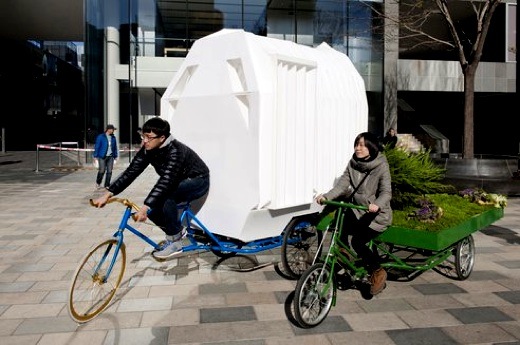
Image above: It's likely the security folks guarding this corporate office plaza will be moving these folks along by sunset. From original article.
Private land ownership is something that most of us might take for granted, but it's not the case in communist China, where all land is either state-owned or run by collective economic organizations (CEOs).
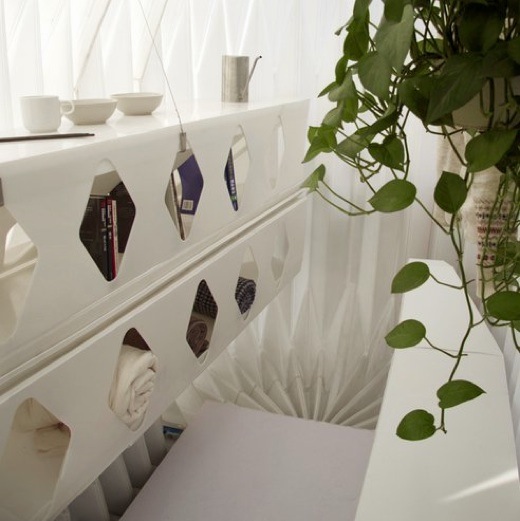
Image above: Note how this "generous" storage system has to be folded-down or placed somewhere else when functions like eating or sleeping are involved. From original article.
But with China's rapidly developing economy, skyrocketing real estate prices, unscrupulous "land grabs" and recent legislation towards a civil code protecting private ownership, the issue of owning land is in a tumultuous transition, prompting designers like People’s Architecture Office (PAO) and the People’s Industrial Design Office (PIDO) to explore different possibilities.
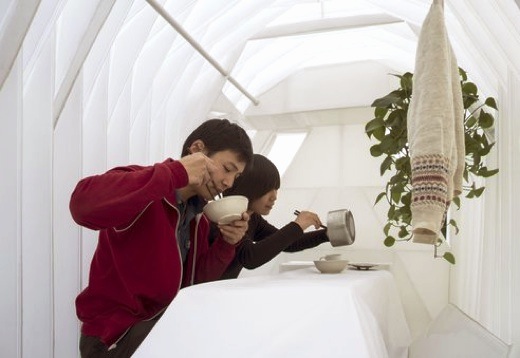
Image above: They don't really show where the cooking and cleaning is done in this kitchen/dining mode - could it be out on the curb? From original article.
Their joint effort is the Tricycle House and Tricycle Garden, a paired mobile home and garden plot mounted on modified three-wheelers. Made with CNC-scored, translucent polypropylene plastic, the house is an accordion-shaped, expandable temporary shelter. Say the designers:
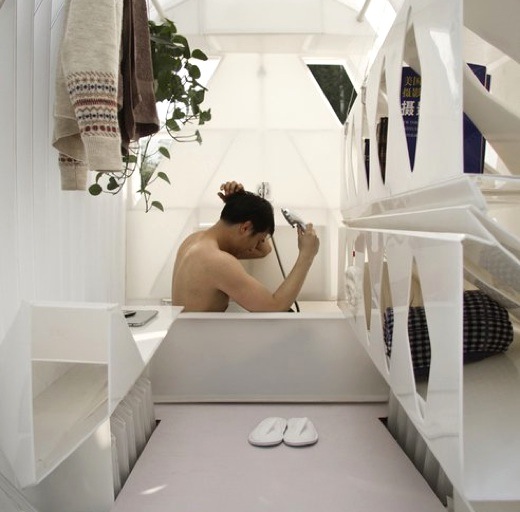
Image above: Does the dirty bath water get drained though the floor and onto the plaza stonework, or what... where's the toilet? From original article.
Created as part of Beijing's Get It Louder 2012 exhibition, Tricycle House was shown alongside other temporary urban shelters, like this one made out of spray foam insulation. Of course, this house's hidden amenities gives it a more comfortable edge, allowing it to be a multipurpose living space in small quarters:
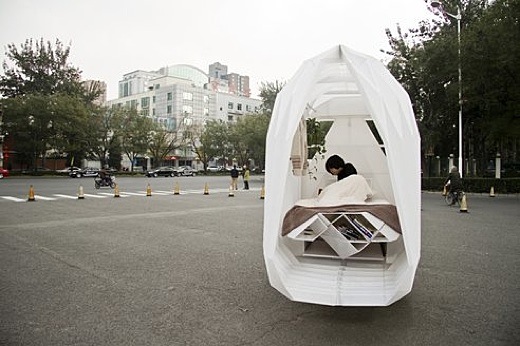
Image above: Ah sweet dreams sleeping on your dining room table over your folded storage unit. From original article.
The mobile garden is a clever addition, showing that living small and on the move doesn't mean a landless existence. More images over at ArchDaily, People’s Architecture Office and the People’s Industrial Design Office.
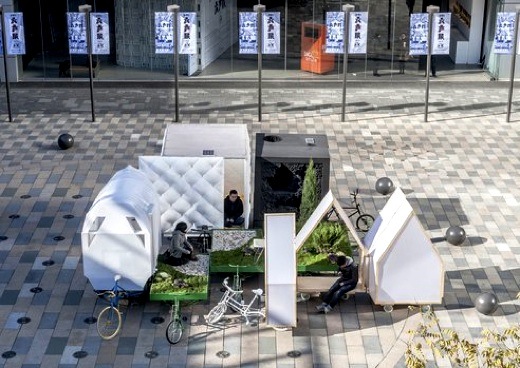
Image above: An romantic encampment on the plaza before sunset, as other like minded bike oriented vagabonds gather after work to get through the night. From original article.
[IB Editor's note: How long will the houseplant or the uncovered raised gardens boxes live? Any longer than it takes to get rid of the dirty bathwater?
This effort by could be a joke or possibly a promo stunt by the cargo bike industry. It could be attempt by the People’s Architecture Office and the People’s Industrial Design Office to misdirect the West into a race to the bottom of industrial design concepts of housing and transportation.
The tin-roofed shacks in America's urban Hoovervilles of the 1930's were better urban housing solutions than these cargo bikes. Today's makeshift slums around (or in) the junkyards major third-world cities are the natural home for these polypropylene hovels.]
.
By Kimberly Mok on 4 January 2013 for TreeHugger -
(http://www.treehugger.com/green-architecture/tricycle-house-peoples-architecture-office.html)

Image above: It's likely the security folks guarding this corporate office plaza will be moving these folks along by sunset. From original article.
Private land ownership is something that most of us might take for granted, but it's not the case in communist China, where all land is either state-owned or run by collective economic organizations (CEOs).

Image above: Note how this "generous" storage system has to be folded-down or placed somewhere else when functions like eating or sleeping are involved. From original article.
But with China's rapidly developing economy, skyrocketing real estate prices, unscrupulous "land grabs" and recent legislation towards a civil code protecting private ownership, the issue of owning land is in a tumultuous transition, prompting designers like People’s Architecture Office (PAO) and the People’s Industrial Design Office (PIDO) to explore different possibilities.

Image above: They don't really show where the cooking and cleaning is done in this kitchen/dining mode - could it be out on the curb? From original article.
Their joint effort is the Tricycle House and Tricycle Garden, a paired mobile home and garden plot mounted on modified three-wheelers. Made with CNC-scored, translucent polypropylene plastic, the house is an accordion-shaped, expandable temporary shelter. Say the designers:
Through this design, single family homes can be affordable and sustainable, parking lots are not wasted at night, and traffic jams are acceptable. The Tricycle House is man-powered allowing off-the-grid living.

Image above: Does the dirty bath water get drained though the floor and onto the plaza stonework, or what... where's the toilet? From original article.
Created as part of Beijing's Get It Louder 2012 exhibition, Tricycle House was shown alongside other temporary urban shelters, like this one made out of spray foam insulation. Of course, this house's hidden amenities gives it a more comfortable edge, allowing it to be a multipurpose living space in small quarters:
Facilities in the [Tricycle] house include a sink and stove, a bathtub, a water tank, and furniture that can transform from a bed to a dining table and bench to a bench and counter top. The sink, stove, and bathtub can collapse into the front wall of the house.

Image above: Ah sweet dreams sleeping on your dining room table over your folded storage unit. From original article.
The mobile garden is a clever addition, showing that living small and on the move doesn't mean a landless existence. More images over at ArchDaily, People’s Architecture Office and the People’s Industrial Design Office.

Image above: An romantic encampment on the plaza before sunset, as other like minded bike oriented vagabonds gather after work to get through the night. From original article.
[IB Editor's note: How long will the houseplant or the uncovered raised gardens boxes live? Any longer than it takes to get rid of the dirty bathwater?
This effort by could be a joke or possibly a promo stunt by the cargo bike industry. It could be attempt by the People’s Architecture Office and the People’s Industrial Design Office to misdirect the West into a race to the bottom of industrial design concepts of housing and transportation.
The tin-roofed shacks in America's urban Hoovervilles of the 1930's were better urban housing solutions than these cargo bikes. Today's makeshift slums around (or in) the junkyards major third-world cities are the natural home for these polypropylene hovels.]
.
No comments :
Post a Comment